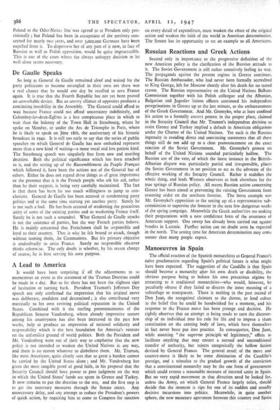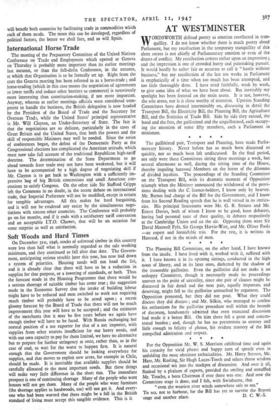Manoeuvres in Spain
The official reaction of the Spanish monarchists to General Franco's have proclamation regarding Spain's political future is what might have been expected. The suggestion of the Caudillo is that Spain should become a monarchy after his own death or disability3 the obvious purpose being to bolster his own precarious regime by attracting to it traditional monarchists—who would, however, be peculiarly obtuse if they failed to discern the inner meaning of a subterfuge so transparent. There is nothing in the past record of Don Juan, the recognised claimant to the throne, to lend colour to the belief that he could be hoodwinked for a moment, and his response to the Franco mos e has been prompt and decisive. He rightly observes that an attempt is being made to turn the dictator- ship of an individual into his rule for life and to impose a sham constitution on the existing body of laws, which have themselves in fact never been put into practice. In consequence, Don Juan, while asserting "the supreme principle sof legitimacy," offers to facilitate anything that may ensure a normal and unconditional transfer of authority, but rejects categorically the hollow fiction devised by General Franco. The general result of the move and counter-move is likely to be some diminution of the Caudillo's prestige, and a stimulus to the gradual growth of the conviction that a constitutional monarchy may be the one form of government which could restore a reasonable measure of internal unity in Spain. But no very rapid movement in that direction need be looked for, unless the Army, on which General Franco largely relies, should decide that the moment is ripe for one of its sudden and usually decisive incursions into politics. Meanwhile, in quite another sphere, the new monetary agreement between this country and Spain
will benefit both countries by facilitating trade in commodities which each of them needs. The more this can be developed, regardless of political factors, the better we shall fare, and so will Spain.



































 Previous page
Previous page